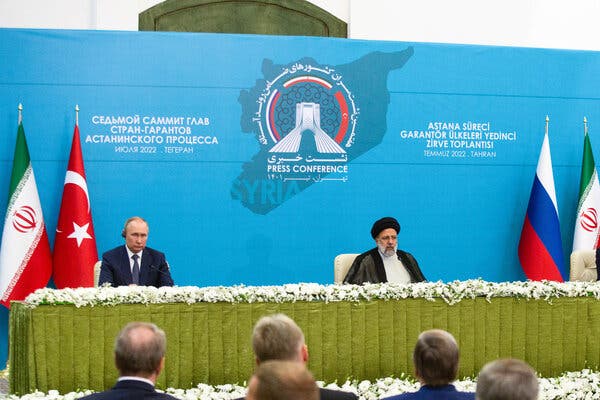| 일 | 월 | 화 | 수 | 목 | 금 | 토 |
|---|---|---|---|---|---|---|
| 1 | 2 | 3 | 4 | 5 | 6 | 7 |
| 8 | 9 | 10 | 11 | 12 | 13 | 14 |
| 15 | 16 | 17 | 18 | 19 | 20 | 21 |
| 22 | 23 | 24 | 25 | 26 | 27 | 28 |
| 29 | 30 |
- 인생그리고여행
- 심장박동기 #페이스메이커 #테니스
- 피규링야 #worldcupsticker #브라질 #아르헨티나 #카타르월드컵
- 통일교 #아베 #재일교포
- 한국인 #민족주의 #신채호
- 아시아인차별 #미국대학입학 #유대인
- Alexandria Ocasio-Cortez #낙태
- Roe v Wade
- 길복순 #약육강식 #아킬레스건
- 아르헨티나상식 #ChatGPT
- 비트겐슈타인 #키에르케고르
- 포르탈레자 #긴머리총각 #댄서
- 에드워드리 #흑백요리사
- 자밀카쇼지 #바이든 #GCC #인플레이션
- 키아누리브스 #산드라블록 #시뮬라시옹 #장자 #호접지몽
- 일주일 #일주일휴가
- 판타나우 #pantanal
- 남미여행블로그
- 엘리자베스2세 #영연방 #commonwealth #elizabeth
- 무어인 #알함브라 #세빌라 #그라나다
- Carnaval #카니발
- 오징어게임 #황동혁 #이정재
- 지미카터 #조바이든 #자말카쇼지 #MBS
- 베네수엘라 #난민 #주기도문
- 유일한 축복
- 보우소나로 #룰라 #브라질대선
- 뉴칼레도니아 #니켈 #전기자동차베터리 #베이징회담 #중국과러시아
- 독일사진사 #포르탈레자
- 고양이 #뒷마당 #고양이새끼
- 아브라함과롯
- Today
- Total
남미의 어느 해변의 브랑코씨
반미 삼국동맹?(NYT) 본문
뉴욕타임즈 칼럼에서 러시아, 중국, 이란 삼국이 가까워지는 상황을 염려섞인 어조로 지적했다. 오늘 늦은 시각에 있을 것으로 예상되는 낸시펠로시 하원의장의 대만 방문은 예정대로 방문이 성사된다면 미국 최정상 인사급으로써는 97년 이후로 처음있게 될 일이다. 이에 대한 중국의 날선 비반과 반발은 시진핑과 바이든의 전화 회담을 포함해 가히 역대급으로 높아지고 있다. 시진핑이 공개적으로 불장난을 하지 말라는 말, 환구시보에서 낸시펠로시의 비행기를 폭파시키겠다는 말을 하는 등 유래없이 그 긴장의 강도가 높아 지고 있다. 미국의 입장에서는 여러가지를 생각할 수 밖에 없는 상황이다. 우선 러시아-우크라이나 전쟁에서 러시아를 제압하기는 커녕 유럽이 에너지 자원을 볼모로 러시아에게 뒷덜미를 잡히고 있고, 전쟁이 장기화 될 수록 불리해져가는 상황에 있다. 이와 관련해 지난 몇년간 회자되던 중국의 대만 침공설이 러시아의 우크라이나 침공 사태를 이 후로 점차 수면 위로 떠오르고 있는 시점에 대만의 안보를 약속한 미국은 긍정적인 스탠스를 대만에 보여주어야 하는 상황인 것이다. 대만의 주요 양당은 정도의 차이는 있지만, 낸시펠로시의 방문을 환영하는 입장을 밝혔다.
아직 세계에서 미국의 군사력과 달러 패권으로 불리는 미국 경제력의 우위는 어느 국가도 넘볼 수 없는 위치에 있다. 지난 100년간 늘 그래 왔으며, 특히 구소련의 붕괴 이후로는 그 힘이 가히 최정점에 달했다. 문제는 유래없는 팬데믹과 인플레이션의 글로벌 위기의 혼란 가운데서, 그 간 세계2위의 경제대국으로 성장한 중국과 지역패권을 다지기위한 군사력과 경제력을 길려온 러시아가 자신의 세를 과시하기 시작한 것이다. 곱지않은 국제사회의 시선에도 양국가는 자신의 입지와 영향력을 다지는대에 전혀 주저함이 없으며, 글로벌 질서의 혼란의 시기를 틈타서 굴기하는 상황이다. 사실 양 국가의 지도자들의 입장에서 본다면, 당연히 벌어질 일이 벌어지고 있다고 볼 수도 있는 것이, 각자가 전제주의 시스템에서 절대권력을 힙입어 국가를 통치하는 상황에서 내외부적으로 지속적인 힘을 과시하는 것이 숙명이기 때문이다. 그 시스템의 정당성을 주는 것이 바로 지속적인 경제 성장이나 지역의 패권을 차지하는 것과 같은 국가의 발전이다.
이 양국의 반미 전선에, 반미하면 빼 놓을 수 없는 이란이 동참했으니, 이란은 중동의 질서를 흔들 수 있는 힘을 가진 국가로 핵개발도 감행하는 등 반미의 수위로만 봐서는 중국과 러시아에 못지 않은 국가다. 그리고 중동의 질서라는 것이 에너지 수급과 관련된 것으로 70년대의 오일쇼코와 러시아침공을 이후로 붉어진 에너지 대난이 불러 일으킨 인플레이션의 대재앙을 생각해 볼 때, 이란이라는 중동의 한 주요 축이 중국과 러시아 편에 굳건히 선다는 것은 중국과 러시아의 입장에서는 대미국 전쟁 혹은 대 서방 전쟁에서 아주 좋은 전력적 자산을 얻은 것과 다름이 없다.
원문 https://www.nytimes.com/2022/08/02/briefing/nancy-pelosi-taiwan-iran-russia.html

Vladimir Putin has traveled outside the boundaries of the former Soviet Union only twice this year. Once was to visit China in February, and once was to visit Iran last month, my colleague David Sanger points out.
Those two countries obviously have something in common. Like Russia, both China and Iran view the U.S. as an adversary. If the world is breaking into two competing blocs — democracy versus autocracy, as President Biden has put it — Russia, China, and Iran make up the core of the anti-U.S. bloc. And they recently seem to be increasing their cooperation.
Their closer ties raise an alarming prospect: What if all three countries decide to confront the U.S. simultaneously
Russia has already invaded Ukraine and has the ability to expand its attack to new parts of the country. Iran has so far refused to re-enter the nuclear pact that Donald Trump canceled and could at some point take steps to build a nuclear weapon. China has become more aggressive toward Taiwan, and U.S. officials have grown concerned about the possibility of an invasion in coming years.
“I’m not predicting it,” David told me, referring to the prospect of simultaneous acts of aggression from China, Iran and Russia. “But there is reason to think it’s plausible, and our system can barely manage one big conflict at a time.”

Tensions in Taiwan
The focus this week has turned to Taiwan. Nancy Pelosi, the speaker of the House, may soon stop there, as part of her current tour of Asia, which would make her the highest-ranking U.S. official to visit the island in years. Newt Gingrich visited in 1997 when he was speaker, and Alex Azar, Trump’s secretary of health and human services, went in 2020.
Chinese officials have reacted angrily to Pelosi’s planned visit, which underscores China’s new aggression toward Taiwan. Xi Jinping, China’s president, seemed to be referring to her last week when he told Biden that the U.S. should not “play with fire.” Some U.S. intelligence officials believe that China may send fighter jets to escort Pelosi’s plane as it approaches Taiwan or take steps in coming weeks to damage Taiwan’s economy.
Biden administration officials yesterday tried to warn China from taking aggressive action. “Our actions are not threatening and they break no new ground,” John Kirby, a spokesman, said at the White House yesterday. “Nothing about this potential visit — potential visit — which oh, by the way, has precedent, would change the status quo.”
There are no easy choices for the U.S. in this situation.
If Pelosi had canceled the visit, she would have been overruling the wishes of Taiwan’s leaders. A visit, said my colleague Amy Qin, who is based in Taiwan, “boosts Taiwan’s legitimacy on the international stage.”
As Edward Wong, a Times correspondent who covers diplomacy from Washington, said, “Supporters of the trip argue that it’s the U.S. sending a message to Beijing that Taiwan is important enough to us that we are going to engage at senior levels.” He described the trip as a version of “diplomatic deterrence,” trying to remind China of the potential consequences if it did invade Taiwan.
A cancellation, by contrast, would have risked sending the message that China can dictate American relations with Taiwan. It would have the potential to repeat the mistakes that the U.S. made with Putin over the past 20 years, when it repeatedly tried to appease him.
Putin invaded Georgia, annexed Ukraine’s Crimea peninsula, murdered Russian dissidents and intervened in the U.S. presidential election in 2016. Each time, the U.S. avoided major confrontation, partly out of a worry that it could spark a larger war. Putin, viewing the U.S. and Western Europe as weak, responded last year with a full-scale invasion of Ukraine.
If China believes the U.S. won’t ultimately come to Taiwan’s defense, the chances of an invasion may increase.
But the risks of a confrontational approach are also real. Pelosi’s visit, for example, may lead Chinese airplanes to near Taiwan in new ways. “If they enter into Taiwan’s territorial airspace, an incident could happen, whether Xi wants one or not,” Bonnie Glaser, the director of the Asia Program at the German Marshall Fund of the U.S., told The Times.

one of this means that a coordinated campaign of aggression from China, Russia and Iran will necessarily happen in coming months. For one thing, the three countries have their own tensions, as David Sanger also notes. China and Russia have been longtime rivals for influence in Asia, and both — like the U.S. — would prefer that Iran not become a nuclear power.
But the three countries also have one overarching shared goal: reducing the geopolitical influence of the U.S., Western Europe, Japan and their allies. Already, China, Russia and Iran have collaborated in recent months, especially in the purchase of Russian and Iranian energy.
All three stand to benefit when the U.S. has to cope with multiple international crises at the same time.
#낸시펠로시 #중국 #대만 #이란
'오피니언' 카테고리의 다른 글
| 팬데믹이 가져가 버린 또 하나(NYT) (0) | 2022.09.01 |
|---|---|
| 일본의 패쇄적인 이민정책과 우크라이나 난민. (0) | 2022.08.31 |
| 미국 민주당 의원들의 반 낙태 시위(Gardian) (0) | 2022.07.20 |
| 바이든, 카터와 닮음꼴? (WSJ) (0) | 2022.07.19 |
| 바이든의 유쾌하지 않은 MBS와의 만남.(Aljazeera) (0) | 2022.07.16 |



